For Companies and Institutions
-
Commercial Banking
We provide credit, financing, treasury and payment solutions to help your business succeed. We also offer best-in-class commercial real estate services for investors and developers.
-
Global Corporate Banking
We help clients achieve their long-term strategic goals through financing, liquidity, payments, risk management and investment banking solutions.
-
Investment Banking
Providing investment banking solutions, including M&A, capital raising and risk management, for a broad range of corporations, institutions and governments.
-
Institutional Investing
We support the entire investment cycle with market-leading research, asset management, analytics, execution, and investor services.
-
Payments
Your partner for commerce, receivables, cross-currency, working capital, blockchain, liquidity and more.
Key Links
For Individuals
-
Wealth Management
With J.P. Morgan Wealth Management, you can invest on your own or work with an advisor to design a personalized investment strategy. We have opportunities for every investor.
-
Private Bank
A uniquely elevated private banking experience shaped around you.
Explore a variety of insights.
Key Links
Insights by Topic
Explore a variety of insights organized by different topics.
Key Links
Insights by Type
Explore a variety of insights organized by different types of content and media.
Key Links
We aim to be the most respected financial services firm in the world, serving corporations and individuals in more than 100 countries.
Key Links
- About us
- Events and Conferences
- India Conference
| Sep 22-23, 2025 | Mumbai, India
India Conference
- • Key takeaways
- • Insights
- • Photos
- • Making an impact
The 10th annual India Conference, held in Mumbai on September 22-23, 2025, brought together 1,100 global investors, c-suite executives, policymakers, and thought leaders to engage in meaningful dialogue and collaboration. Delegates explored pivotal themes shaping India and the global economy through CEO tracks, one-on-one meetings, and plenary sessions. The conference remains a premier platform for forging connections and uncovering new opportunities as India’s role in the global marketplace evolves.

Key takeaways from the
J.P. Morgan India Conference 2025
Which sectors are driving growth in India’s $4 trillion economy?
India’s GDP growth has consistently outpaced expectations, with over 6% expansion projected for both 2025 and 2026 — cementing its position as the world’s fastest growing major economy. At J.P. Morgan’s 10th annual India Conference in Mumbai, investors focused on the pivotal role consumer spending and major investments in manufacturing and infrastructure will play in driving the country’s next phase of growth.
India’s economy recently delivered a surprise acceleration, with GDP growth reaching 7.8% in the quarter ending in June — the fastest pace in over a year and well above expectations. This momentum was fueled by robust manufacturing and construction output, alongside increased government spending and services activity.
Despite this, rising concerns over a potential slowdown in India’s growth were a key focus at the two-day event, in light of the 50% U.S. tariff on Indian imports and the increase in U.S. H-1B visa fees. However, recent policy actions — including the landmark GST overhaul and monetary policy easing — are expected to help partially ease the adverse impact of tariffs in the coming quarters.
“While India’s economy faces external headwinds, there are growing domestic supports in benign inflation, a strong monsoon, monetary easing working through the system and both direct and indirect tax cuts,” said Sajjid Chinoy, head of Asia Economics and chief India economist at J.P. Morgan.
Challa Sreenivasulu Setty, the chairman of the State Bank of India (SBI), highlighted while most nations are growing less than 3% a year, India’s expansion continues to demonstrate resilience.

Setty suggested a long-term growth rate of 7–7.25% is achievable, given India’s demographic dynamics.
Similarly, Jamie Dimon, chairman and CEO of JPMorganChase, was optimistic about the country’s ability to sustain its elevated level of growth for years to come.
“India’s economy is estimated to grow around 6% this year and some forecasts suggest it should be striving for 6–7% for the next 20 years,” he said.
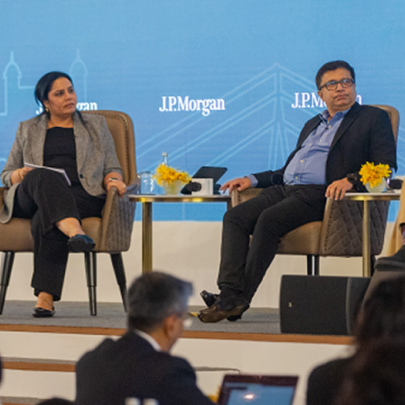
India’s consumption story was another leading theme, as the government’s incoming GST tax cuts will make a wide range of essential and luxury products more affordable for households. These changes, combined with recent income tax relief, are expected to encourage greater spending on items like food, consumer goods, appliances, apparel and footwear.
India’s GST (Goods and Services Tax) Council is lowering tax rates from September 22 for essentials (5% or exempt) and aspirational products, such as premium food and beverage and high-end electronics (18%), while luxury goods and sectors such as alcohol and tobacco face a higher rate of 40%.
Business leaders highlighted how rising disposable incomes, digital innovation and the rapid growth of online and quick commerce are reshaping consumer demand across both urban and rural markets. As households increase their discretionary spending, companies are preparing for stronger sales and new investments. The overall benefit to consumers is estimated at around 0.6% of GDP, positioning consumption as a key driver of India’s next phase of economic growth.
During a panel discussion about consumer trends, Saugata Gupta, CEO and managing director of consumer goods company Marico, said the new tax cuts could lead to lower prices in certain categories with high price elasticity, such as fast food and groceries, where demand is highly sensitive to price changes. The tax cuts should also help neutralize “shrinkflation” and give sales of consumer goods a positive bump, Gupta added.
For fast food delivery, Sameer Khetarpal, CEO and managing director of Jubilant FoodWorks (the operator of brands such as Domino’s Pizza and Popeyes in India), said more detailed customer profiling, tech improvements and the incoming cuts will help further boost sales.
Around 60% of pizza sales occur between 7 pm and 11 pm, but late-night orders now account for up to 10% of volumes, driven by Gen Z’s frequent app-based ordering and unique meal habits, Khetarpal added
“Consumption in India has been underwhelming for a variety of reasons and along with various policy measures, GST will be a key enabler, as it will drive end-consumer prices down. We are cautiously optimistic for demand revival ahead,” said Latika Chopra, head of India Consumer and Discretionary Research at J.P. Morgan, in an interview with CNBC TV18 on the sidelines of the conference.
India’s government has outlined plans to become a $30 trillion economy by 2047, up from $4 trillion today. Infrastructure development will be key to achieving this goal, with plans including the construction of 100 smart cities. Momentum is being driven by both public and private sector initiatives, as well as a renewed focus on quality, innovation and long-term value creation.
Panelists discussed how infrastructure development and manufacturing are becoming major engines of growth. Abhishek Lodha, CEO and managing director of Lodha Developers, emphasized how India’s transition to a middle-income economy is fueling a multi-decade housing cycle, with demand for home ownership and urbanization creating ripple effects across hundreds of related industries.
Regulatory reforms, such as the Real Estate Regulatory Act (RERA) and GST, have strengthened the sector’s foundation, making it more transparent and resilient, while large-scale projects like data centers and green developments are opening up new avenues for investment.
“The Indian real estate sector is projected to grow from $500 billion to $5 trillion by 2047 as the country transitions from a low-income economy on the basis of per capita GDP to a middle-income economy,” said Bhavin Shukla, head of India Real Assets at J.P. Morgan.
Anish Shah, group CEO and managing director of Mahindra Group, one of India’s largest automakers, underscored the importance of manufacturing in India’s long-term growth strategy. He noted the sector will need to expand to the equivalent of 25% of the economy at $8 trillion, up from $500 billion today, in order to support the country’s ambitions.
Shah pointed out improvements in product quality, global competitiveness and the rapid pace of infrastructure development — such as building roads at 40 miles a day and adding new airports every month — as key factors driving growth.
India’s electronics manufacturing sector is also undergoing a transformation, with output expanding sixfold over the past decade, as exports have hit $40 billion. Ashwini Vaishnaw, honorable union minister of Railways, Information, Broadcasting and Information Technology, discussed how government initiatives such as the Electronics Component Manufacturing Scheme and the India Semiconductor Mission have attracted significant investment. New manufacturing hubs have emerged across the country and pilot semiconductor production is underway.
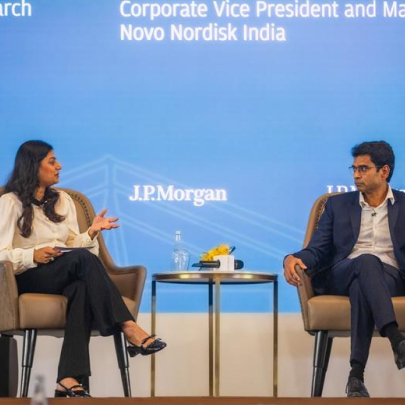
India’s pharmaceutical industry is entering a new era of growth, as the country responds to rising health challenges and global demand for advanced therapies. With a vast patient population — over 100 million people live with diabetes and hundreds of millions more are affected by obesity — there has been a rapid uptake of GLP-1 drugs.
India’s pharmaceutical industry is entering a new era of growth, as the country responds to rising health challenges and global demand for advanced therapies. With a vast patient population — over 100 million people live with diabetes and hundreds of millions more are affected by obesity — there has been a rapid uptake of GLP-1 drugs.
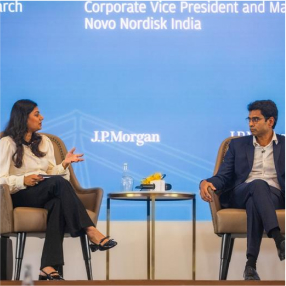
GLP-1 drugs have emerged as one of the fastest growing segments in global pharmaceuticals. J.P. Morgan projects the market could reach $160 billion by 2030, up from $54 billion last year. Dominated by pharmaceutical giants Novo Nordisk and Eli Lilly, these weight loss drugs are now equally used for diabetes and obesity, reflecting a major shift in treatment approaches.
The introduction of newer GLP-1 drugs, such as semaglutide and tirzepatide, is transforming diabetes and obesity management in India, offering substantial benefits including significant weight loss and reduced reliance on insulin.
Dr. Vinod Babu, a panelist and consultant diabetologist at Dr. Mohan’s Diabetes Specialties Centre, said India faces a unique set of circumstances as result of the country's high-carbohydrate diet. He noted the main challenge faced in practices across India today is that patients do not see obesity as a health issue, which could lead to far greater health complications in the coming decades.
As patents expire, the market is set to become more competitive, with multiple Indian companies preparing to launch generic versions of GLP-1s — potentially making these treatments more affordable and accessible across metro, tier-two and tier-three cities.
Vikrant Shrotriya, corporate vice president and managing director of Novo Nordisk India, said the country has become central to the company’s global strategy. GLP-1 drugs have proven especially successful in India, with clinicians reporting up to 90% of patients experiencing significant weight loss — often surpassing results seen in Western populations. Discontinuation rates due to side effects are also notably lower among Indian patients, likely due to genetic factors and strong clinical support, Shrotriya added.
With Novo Nordisk’s key drug, semaglutide, set to go off patent next year in several countries — including India — the domestic market is poised for significant expansion.
Insights
What’s India’s growth outlook?
With Jamie Dimon, Chairman and CEO
What’s India’s growth outlook?
With Jamie Dimon, Chairman and CEO
Unpacked: Development Finance
Affordable and clean energy, widespread access to healthcare and education, quality jobs and infrastructure, safe and sustainable cities. These are pretty ambitious goals for developing countries, so how can we get there? By raising about an extra 2.5 trillion dollars of annual financing until the year 2030.
This is: Development Finance Unpacked
Back in 1944, the concept of development finance was born. Institutions like the World Bank were created to fund the rebuilding of vital infrastructure and services across efforts of war-torn European countries.
Since then, development finance has evolved into what it is today: Funding projects that improve the quality of life and well-being of people in developing countries.
In September 2000, a critical milestone took place when all United Nations members agreed on a set of development goals to achieve by 2015 called the “Millennium Development Goals.”
The idea? To rally world leaders around efforts to fight extreme poverty, expand access to quality jobs and healthcare, and more.
As 2015 approached, the United Nations formed 17 new Sustainable Development Goals to be achieved by 2030. They aimed to advance progress on things like: clean water, infrastructure, education, sustainable farming, improved mobility, and more.
Sustainability is the connecting force between them, emphasizing the necessary balance between economic growth, social inclusion, and environmental protection.
The estimated total investment needed to achieve the SDGs in emerging economies ranges between 3.3 to 4.5 trillion dollars per year.
Currently, we’re only half way there. According to the United Nations, there is a 2.5 trillion dollar gap of development finance – per year – until 2030.
Historically, the development financing has primarily come from public institutions, which are owned and operated by government shareholders.
It can also come from multilateral institutions, like the World Bank. They receive funding from multiple member governments and use it across projects in developing countries. Currently, around one hundred and forty countries are eligible to borrow from the World Bank.
However, this annual funding gap can’t be closed by public institutions alone. To do it the private sector – think multinational corporations or financial institutions – must play a leading role.
Private organizations can offer more capital, access to investors, structuring expertise and a global network.
It could be a direct investment like opening a factory, or a portfolio investment, like an asset manager buying a bond from a government to provide clean water.
Let’s look at an example of how development finance works. Let’s say a government agency in Saharan Africa, to build new infrastructure to provide clean water. While this may intuitively feel “developmental”, a development finance institution will thoroughly evaluate whether this qualifies as a development finance opportunity.
Certain questions could include: Will the infrastructure serve areas that struggle to access clean water? Will it be resilient to climate change? Does the agency provide quality jobs and training to employees?
If a project meets the necessary requirements, the development finance institution will connect this opportunity with potential investors – usually those interested in supporting development finance activities, like an impact investor or an ESG investment fund manager.
From there, projects that support the SDGs and have impact in developing countries, receive their needed funding and we move one step closer to closing that 2.5 trillion annual dollar gap.
[End of video]
Financing sustainable development
Nancy Lee: Companies and sovereigns in EMDEs need to be able to make the case to investors that their issuances have tangible impact, and investors need to be able to demonstrate impact to shareholders and to standard setters wary of greenwashing and other forms of overstating impact. Most of us need to be able to judge whether these flows that are labeled as ESG flows are actually contributing to the goals and the impact that we all need.
Arsalan Mahtafar: I'm going to first describe why we created the Impact Disclosure Task Force. I mean, as you know, there's no shortage of task forces in sustainable finance and sustainability. So why did we think yet another one was warranted? What was the problem that we're trying to solve? Sustainable finance is a real asset class. You know, by some measures, as Nancy mentioned, there's $41 trillion of assets under management that have some measure of ESG integrated. Most of that is ESG integration, meaning that it's more from a risk management approach, but there's about 10% that is for sustainability and impact strategies, meaning that the investors are actually seeking sustainable outcomes and want to make a change in the world. But if you look at where that money is actually flowing, most of that is going, and Nancy mentioned this, is going to developed markets. And there's a lot of reasons for that. There's market risk, there's credit risk, there's geopolitical risk, but there's non-financial reasons for that as well. If you are, let's say, a Brazilian agriculture company that has a business strategy to give better inputs to farmers to increase their agricultural productivity, to train farmers to ensure that their supply chain is free of deforestation, is free of human rights abuse.
Arsalan Mahtafar: If they might be creating good quality jobs, you might completely fly under the radar of sustainable investors because you don't check one of those two boxes. That is the problem that we tried to solve with this task force. The guidance actually envisions an ecosystem that has three components. One component is that Sustainable Development Impact Disclosure, or what we're calling SDID. And the guidance essentially gives a playbook on how entities should navigate existing resources to identify the metrics that, based on a theory of change, describes their impact intentions and helps to measure those impact intentions, then helps them do the materiality assessment to identify which ones are the ones that should be prioritized based on their local context, and then set targets for those prioritized metrics. For the negative impacts,
Arsalan Mahtafar: we should also make sure that they’re kind of adhering to the standards for do no significant harm, maintaining minimum safeguards by showing what are the policies and procedures they have in place that will help them manage environmental and social risks and mitigate negative impacts. The entity also commits to monitoring and reporting progress against those intentions. If you actually want to know what did they really achieve after they set out the vision, we envisioned a data platform where this information can be digitized, aggregated, and then disseminated at scale.
Arsalan Mahtafar: And then the last component is a network of ancillary services. Because at the end of the day, what's really important here is trust. And to enhance the trust, we're thinking about what are the third parties that can help with independent verification, with monitoring and evaluation, with analytics to ultimately decipher all that information and make sense of it. So it could be usable for investors when they want to determine whether it's eligible for their portfolios or not.
Marc-Andre Blanchard: There's no doubt in our mind that guidelines like that will actually enhance the universe of potential investments for us. I mean, that's the baseline, there's no doubt. Just think about social impacts overall. I mean, there's an issue of being able to assess and to measure impact outside of pure carbon footprint. When the information is lacking, what do you do?
Elizabeth Seager: You tend to overestimate the risk, underestimate the opportunity. I see on the task force as an observer, just making sure that we continue to build this alignment versus reinventing any wheels and participated in that context. Companies may have other stakeholders to whom they want to communicate beyond the sort of common investors, as the ISSB is focused on.
Elizabeth Seager: And so we have what we call this building block approach, where we're trying to develop the common language for companies to disclose to investors around the world, but recognize that they'll want to add on top of that in some cases. So it's in this context that we entered into the observer status of the task force to support this ongoing lack of or reduction of fragmentation and alignment as it relates to expectations for company disclosures.
Maha AlQattan: We know that there are many impact and sustainable investors out there like CDPQ who are looking for bankable long-term investment opportunities in emerging markets. The problem is, as everyone mentioned, lack of transparency, lack of market information, which really makes it very difficult for them to assess the associated risk. Many of the disclosure frameworks today fail to address the, I would say, the development impact linked with the sustainable linked finance allocation.
Maha AlQattan: What this framework does is it addresses these challenges. It gives you accountability, transparency. But it also goes further to really give companies the opportunity to report on progress against SDGs at a very local level. And finally, it does not only make you report on the positive impact, it also helps us look at the associated environmental and social risks and put mitigation plans for those risks.
Nancy Lee: There is this perception in a lot of circles that asking the investee to report more on impact, in particular in the rigorous way that Arsalan was talking about, you know, what's the baseline, what's the change, is a burden. That's not how you're describing it. So say a little bit more about why this helps you. The framework is pretty much aligned with many of the emerging reporting standards like ISSB and even with rating agencies.
Maha AlQattan: So it actually does not increase the burden of reporting because of the alignment and overlap. It just makes it easier for us to report on many of other reporting standards. You need a framework. You need to talk about where you're going to be focusing your effort, what metrics and outcomes are you hoping to get, and how are you going to report on those and how transparently and how often?
Tom Eveson: And that's why we really wanted to participate in this because that's all pre-issuance. That's all on an intent to attract capital to say when and if we raise this capital, we will allocate it to projects that are credibly green with credible possibilities of outcome and a good governance structure and reporting to do so. And that's really what the sustainable bond industry has grown up doing.
Tom Eveson: And that's from the first one several years ago to where we are now at trillions and thousands of bonds outstanding. And the questions are starting to be asked, what's the outcome? If this gives form and process to more disclosure on the benefits of some of these projects and entities in these regions, then our company will incorporate that.
Tom Eveson: And what we do is basically opine and say, these are good practices for identifying what your impact is going to be and reporting on an ongoing basis. And I can't see that being anything but beneficial to the whole industry of trying to develop more projects and moving more capital to the developing south.
[End of video]
[Music]
Introducing the Impact Disclosure Taskforce at COP28
Arsalan Mahtafar: The good news is that the volume of capital managed by sustainable investors that are seeking sustainable outcomes are continuing to grow. But at the same time, achieving the sustainable development goals and financing the sustainable development goals still remain out of reach.
So this panel will unpack this problem and introduce the Impact Disclosure Task Force, an initiative launched by a network of financial institutions to leverage the principles of impact measurement and monitoring to direct sustainable capital to where it's needed most.
John Murton: There is finance flowing towards sustainable finance, but it's primarily flowing to climate-related goals, and it's primarily flowing to developed markets, rather than emerging markets. It's much easier, for a range of reasons, to finance a solar power plant in France than it is in India, which is unfortunate, in climate terms, because the solar power plant in India will displace much more carbon than the solar power plant in France.
It's much easier to finance a solar power plant in India than it is to finance a social development project. Part of that is due to the data that's available. It's much easier to prove the impact in, say, emissions avoided for a solar power plant than it is for a water project that might serve a rural community in a developing market.
So as a result, with the lack of data, it's difficult to bring capital in. It's difficult to bring investment in to maybe where it's required most. And it's only by scaling that private sector investment, not just in solar plants in India, but in water projects, in projects to conserve biodiversity, that we're going to deliver on the development goals.
Adam Mariko: The SDG gap is quite huge. And I think the problem should not be just to call for more money. It's to change the financial system to reorient the existing money somehow to SDGs finance and sustainable finance.
John Murton: It's a network of public and private financial institutions, and capital market participants, and industry stakeholders. And what they're doing is they're drafting voluntary guidance for entity-level disclosure, so disclosure at a corporate entity level, about impact and giving us mechanisms to facilitate impact reporting across an entity and data provision so that we can then deliver financing against that.
What it will do is it will deliver, hopefully, forward-looking targets that address development gaps. So a company, an entity will develop forward-looking targets that address development gaps and are specific to their context and the markets that they operate in, which means they're going to be different in Bangladesh than in Bolivia or in Brussels. And that's really important.
And they will establish mechanisms to disseminate and analyze that entity-level impact information into digestible bites so that it will foster accountability and transparency so that investors and people considering investments will be able to understand that information and invest on the basis of it. And that gives financial institutions and decision-makers more capacity to identify where their finance, where their money will have a real impact and allocate accordingly.
Bertrand Millot: There's four things that we would look at. We would look at trying to identify intentions. Impact-- the difference between the two is intentions. It's really, really important to understand that. What are we trying to change in the world? And obviously, it has to be looked at in the context of what the problems are related to your industry or the place where you're doing business.
And then you think, OK, well, set targets. How am I going to change that? And then make sure that, obviously, you measure it, and you disclose what you intend to do, and you look at progress going forward. So that's really the difference between the two.
Ayla Bajwa: We're an end-to-end logistics solution provider. And so one of our key pillars is-- or key verticals are ports, as mentioned earlier, so ports and terminals. And so the port and terminal space is interesting because your customer is often a government. And so governments ask you, what are you going to do for my country?
And so when that becomes the question, you no longer are a project investor, as mentioned while talking about the impact disclosure framework. You're an ecosystem investor. And so when you're an ecosystem investor, you're not looking at just the asset.
You're looking at, yes, spillage, waste management, and all the rest of it, but you're also looking at coastal systems. You're looking at people positive. You're looking at nature positive. You're really looking at the full gamut. And so, today, as DP World, we are-- so I think one good example of a market that we've done this well is Berbera. So, in fact, we have a documentary that was released just a couple of hours ago that we've done with The Wall Street Journal, but it really brings what we do to life, which is we look at employment. We look at the needs of the country from an education point of view, from a from a water access point of view, and so all of it guided by something we call the "our world, our future" strategy.
And so the "our world, our future" strategy is our sustainability strategy. But if you look at the framework, it has business priorities. So we have identified business priorities and community contributions-- what we call community investment-- because we're there for the long run.
So often, the investors or other stakeholders are nervous because they need short-term return. And as DP World, we're in it for the long haul. We get it. You're going to go into the Global South? It's going to take time.
And so what actually has been positive to see-- and Berbera continues to be a good example for it-- is because we had faith in Berbera, and we invested in Berbera, and we looked at the poor-- the economic zone, the water access, the education, all of it looking, now at coral and reef restoration, the full situation, now we see other entities having the confidence to invest in Berbera.
Erin Leonard: The good news is that we do see very strong growth in sustainable investment. You may not read about that in the newspapers every day, but our own sustainable investments have grown from 1%, I think just three to four years ago, to about 10% of our total assets. So it's increasingly in focus for us.
And as part of our mission-- obviously, we're investing for returns. We're investing for our investors. But we do want to create products that are supporting the emerging economies and that are facilitating the flow of capital to the projects and the businesses that really need the money. So that's the part that makes me enjoy my job the most, I would like to say.
But back to complexity, we manage money across, I think, 12 different locations currently. We hold over 30,000 securities. So access to information and data is absolutely one of our biggest challenges.
And so initiatives like this that are going to facilitate the provision of information are absolutely critical to our day-to-day activities. And so we want to see this type of activity really take hold and become widely accepted through the industry.
I mean, it's as simple as the fact that, if we can't get sustainability information on an issuer, we are not going to invest because we just don't have the transparency. So it really is tied directly to the flow of capital.
Adam Mariko: We were very proud, in AFD, to join the task force and this discussion because, if private sector goes in this discussion alone, building norms in their own will, I think there is a faith and will to do it, but no one will believe it, somehow, because there is always this risk on saying, OK, where is the catch?
That's why, also, the public development banks and all the work and the data we are accumulating is useful to put it in the public good. And that's why AFD have pushed, also, to be there. At some point, mobilizing private capital is not just at the project level. Even the funding that we are using-- I come from the finance business of the of the bank. We issue 10 billion euro bonds every year.
And our goal is, within two years, to certify all our balance sheet SDG-aligned, which, I hope, will avoid us to justify every bonds with the reporting that goes with it. At some point, the investor should understand that investing in this balance sheet has incentive for them, and it's an aligned investment they are doing, which means we should have clear norms and data on all those perspectives.
Erin Leonard: Our approach is that we would much rather engage with companies than divest. We want to work with companies to understand their practices, understand their challenges. We like to think that we can also help companies with their transition plans by maybe giving information on other practices that we see going on in the marketplace. So with information, we're better empowered to engage.
Bertrand Millot: By pushing companies to do the right thing is how things are going to change. We can't do it ourselves. We invest in companies. And so it is a very, very important aspect.
There's different ways to do it, depending on which kind of company you invest in. You should-- you have the obligation to actually vote on the annual general meeting. And for example, if you take climate as an example, we have a well-articulated strategy to engage the company to discuss with them what they're up to, and then if we're not happy, to potentially raise that to a more senior level, chair of the board.
If we continue not to be happy, we can actually submit a shareholder proposal in a formal process, which will then be subject to a vote. And then, in the end, there is always the option of voting against the board directors who are in charge of sustainability, for example.
Ayla Bajwa: Today, a lot of our investment that we're talking about and that will feed into these impact metrics is because we have a multi-stakeholder engagement approach. But I will tell you, if we had a tunnel-vision investor approach, we would not be incentivized today to be investing in education, or water, or any of this. So help us out. We really want to. But if you don't hold us to task, then it's going to be difficult for us to get it over the line internally.
Erin Leonard: Very important, but I think we also have to recognize that, in the emerging markets, adding extra layers of cost associated with verification schemes is a big ask. And the way that we, as asset managers, look at it-- of course, if we've got a third-party verification, that makes our lives easier, cleaner. We can probably do a little bit less homework ourselves.
But we do also value self-certification with companies that have the good governance, that have proper risk management frameworks and assurance frameworks, et cetera. And I believe I'm right about this-- that even MSCI, in terms of the data that they bring in, they actually will reference where data coming in is third-party-verified or self-assured.
Those factor into our scoring models. So again, higher score if you have third-party verification, but your company will be considered if it is self-assured.
[End of video]
[Music]
Roshan: Arsalan, so can you walk us through the key milestones and achievements for 2024 for the Development Finance Institution?
Arsalan: Sure. There are actually three key achievements I would like to highlight. 2024 was a record year for us. We did 22 client engagements where we helped attract impact-focused investors for $5.6 billion of transactions. And for the first time, we actually started serving clients in higher-income jurisdictions to measure the development impact of their operations in developing countries and attract capital for those pieces of their operations.
The second thing is that, as you know, we also work to measure the development impact of the entire Commercial & Investment Bank, regardless of whether we were attracting impact investors for those specific transactions, but to measure the development impact of the firm. And 2024 was yet another record there, where we evaluated $139 billion of transactions that J.P. Morgan executed to have development impact.
And lastly, we have been serving as the co-chair of the Impact Disclosure Task Force, a network of about 80 financial institutions and capital markets stakeholders, to scale financing for the Sustainable Development Goals over the past two years. 2024 was a key milestone for us as in October 2024, we published the Impact Disclosure Guidance, which created a simplified and harmonized way for entities to measure and disclose their development impact and to attract impact investors.
And that, we think, is going to be a stepping stone to really scaling financing for the SDGs.Roshan: So for 2025, what are DFI’s key priorities looking ahead for the year? And I want to know what are you most excited about.
Arsalan: Well, what really excites me about 2025 is our effort to facilitate the provision of impact data in financial markets by creating a new impact data and analytics platform.
And to do that, we’re now partnering with a set of other banks to apply this common methodology using AI and LLMs and other advanced technologies across the investable universe, and facilitating the provision of this data and the usage of this data, and ultimately the integration of this data into capital allocation decision-making — something that we think over the next five years can actually help create a new trillion-dollar asset class for sustainable investors.
[End of video]
[Music]
Roshan: Arsalan, so can you walk us through the key milestones and achievements for 2024 for the Development Finance Institution?
Arsalan: Sure. There are actually three key achievements I would like to highlight. 2024 was a record year for us. We did 22 client engagements where we helped attract impact-focused investors for $5.6 billion of transactions. And for the first time, we actually started serving clients in higher-income jurisdictions to measure the development impact of their operations in developing countries and attract capital for those pieces of their operations.
The second thing is that, as you know, we also work to measure the development impact of the entire Commercial & Investment Bank, regardless of whether we were attracting impact investors for those specific transactions, but to measure the development impact of the firm. And 2024 was yet another record there, where we evaluated $139 billion of transactions that J.P. Morgan executed to have development impact.
And lastly, we have been serving as the co-chair of the Impact Disclosure Task Force, a network of about 80 financial institutions and capital markets stakeholders, to scale financing for the Sustainable Development Goals over the past two years. 2024 was a key milestone for us as in October 2024, we published the Impact Disclosure Guidance, which created a simplified and harmonized way for entities to measure and disclose their development impact and to attract impact investors.
And that, we think, is going to be a stepping stone to really scaling financing for the SDGs.Roshan: So for 2025, what are DFI’s key priorities looking ahead for the year? And I want to know what are you most excited about.
Arsalan: Well, what really excites me about 2025 is our effort to facilitate the provision of impact data in financial markets by creating a new impact data and analytics platform.
And to do that, we’re now partnering with a set of other banks to apply this common methodology using AI and LLMs and other advanced technologies across the investable universe, and facilitating the provision of this data and the usage of this data, and ultimately the integration of this data into capital allocation decision-making — something that we think over the next five years can actually help create a new trillion-dollar asset class for sustainable investors.
[End of video]
Conference photos
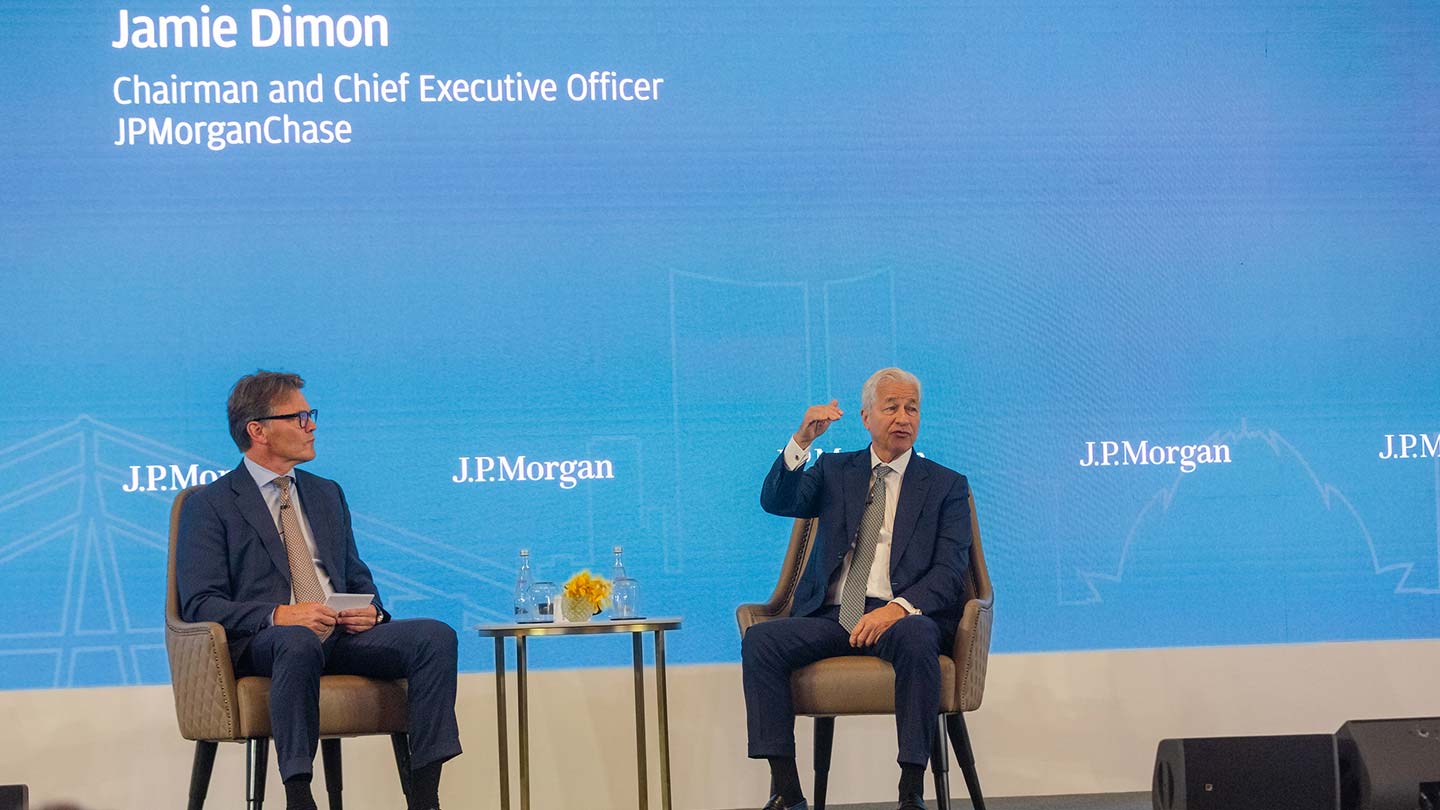
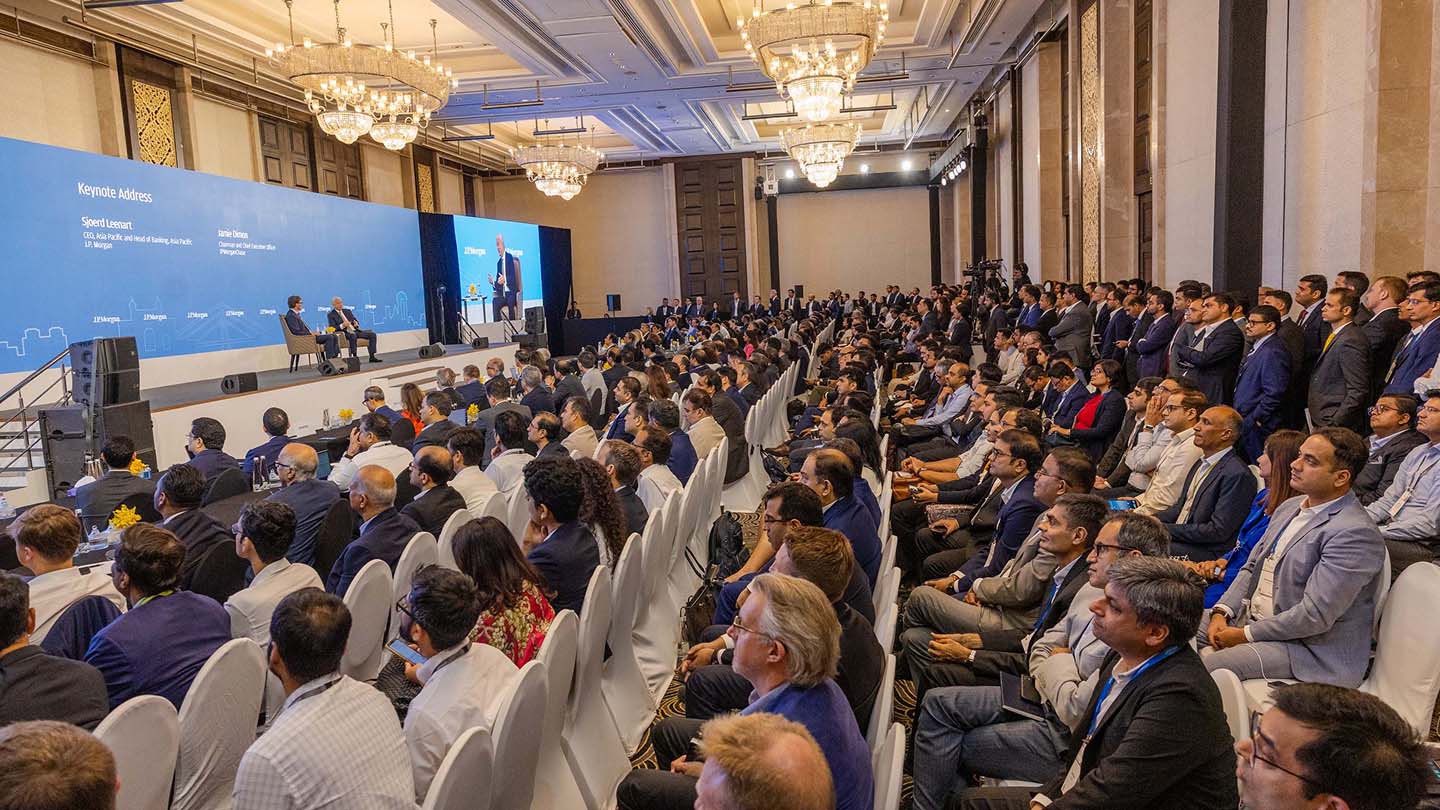
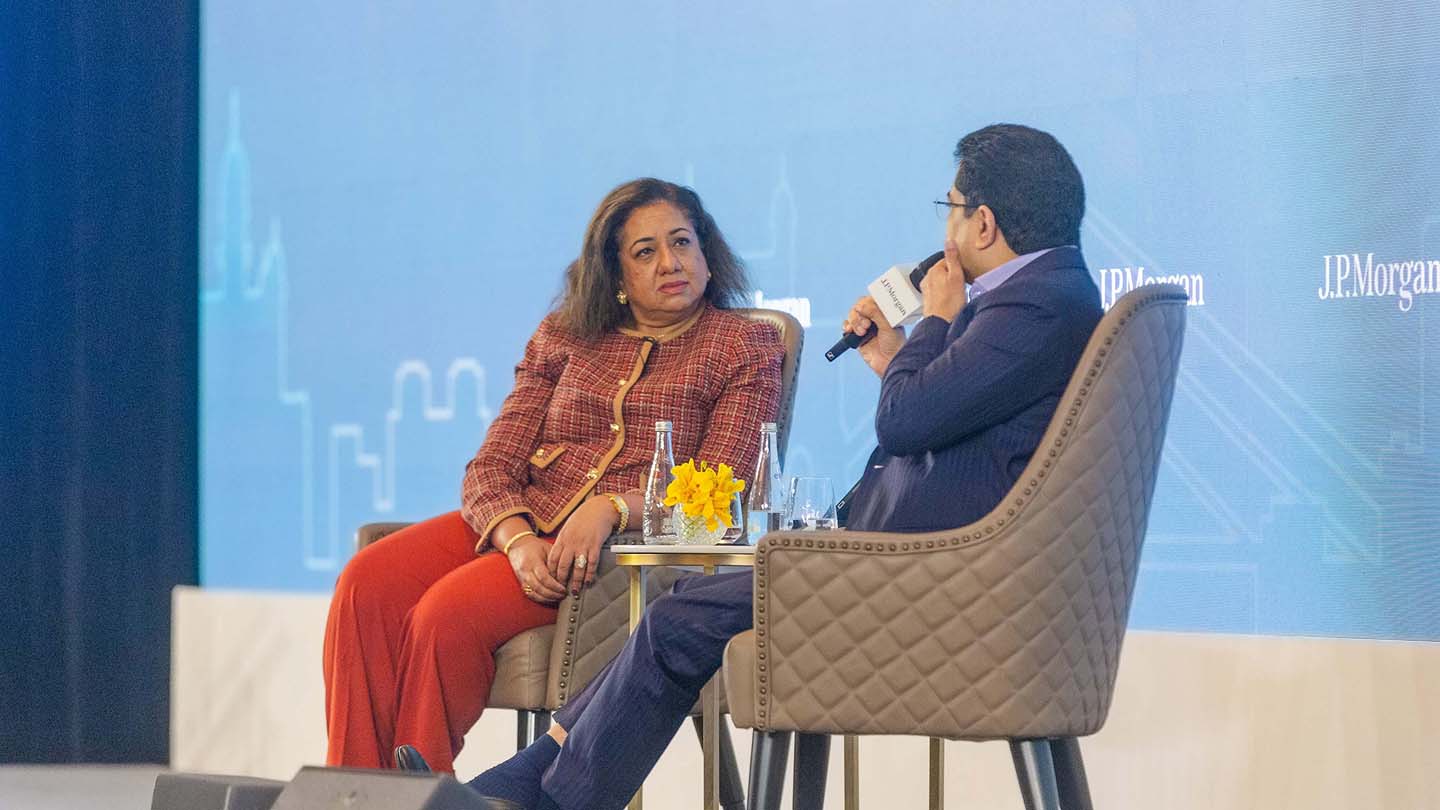
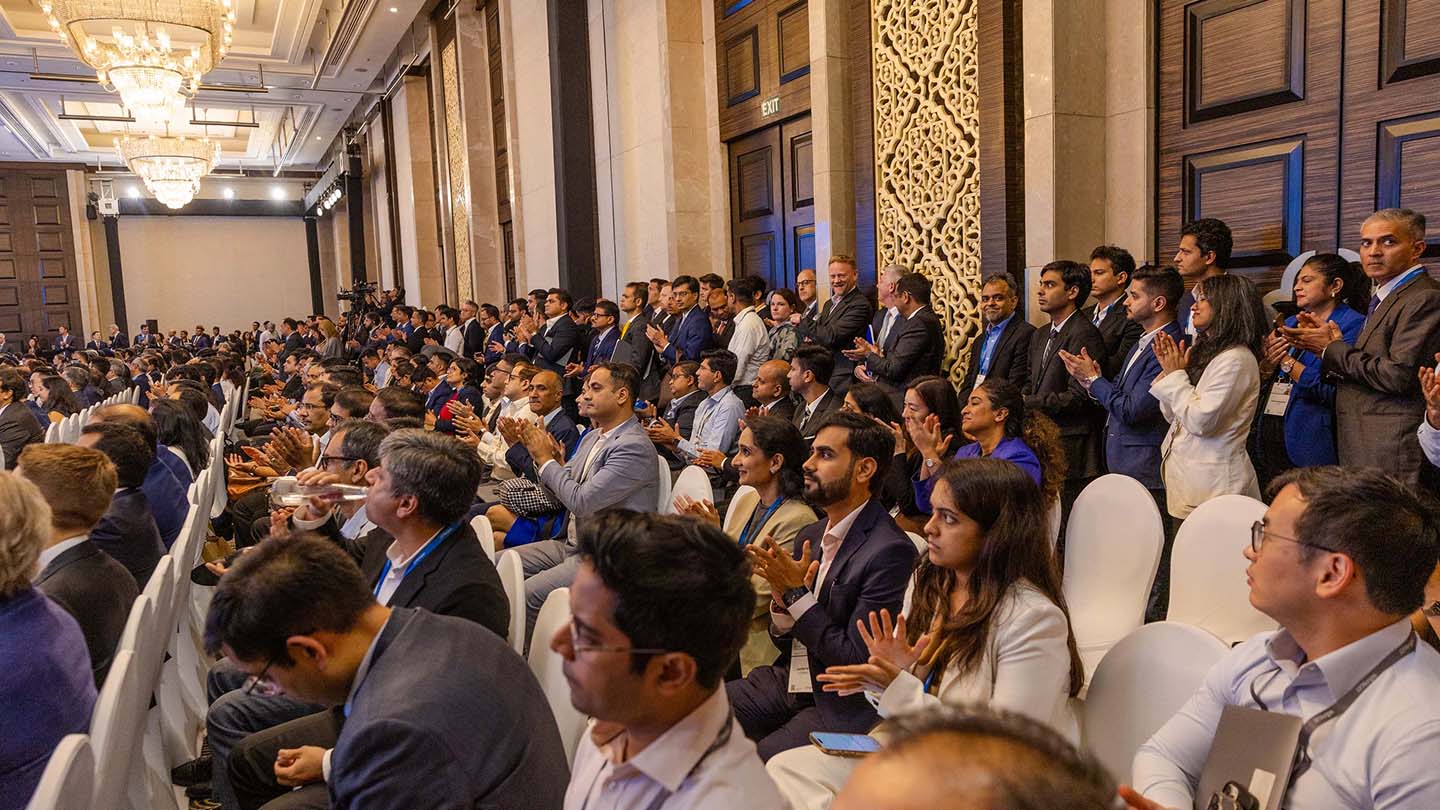
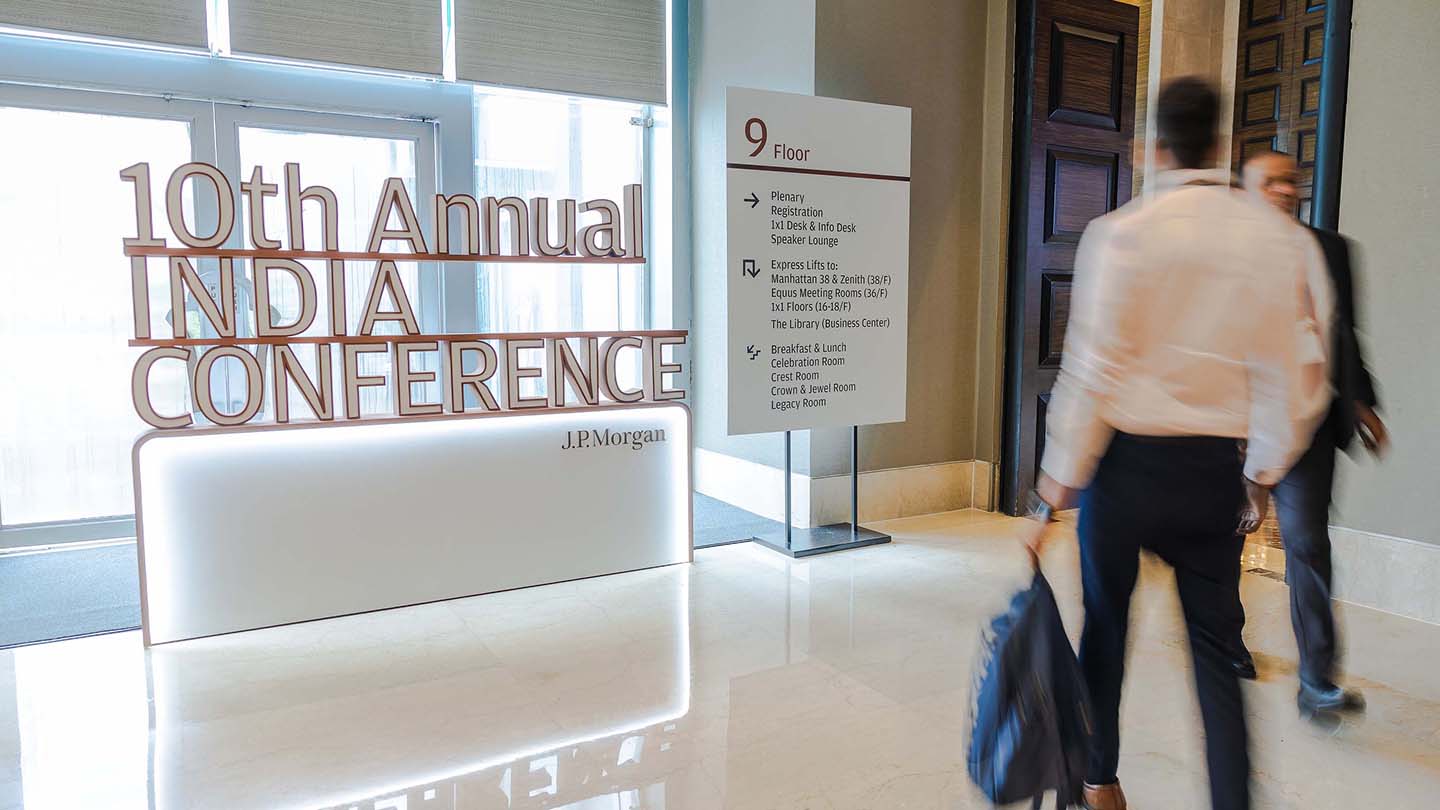
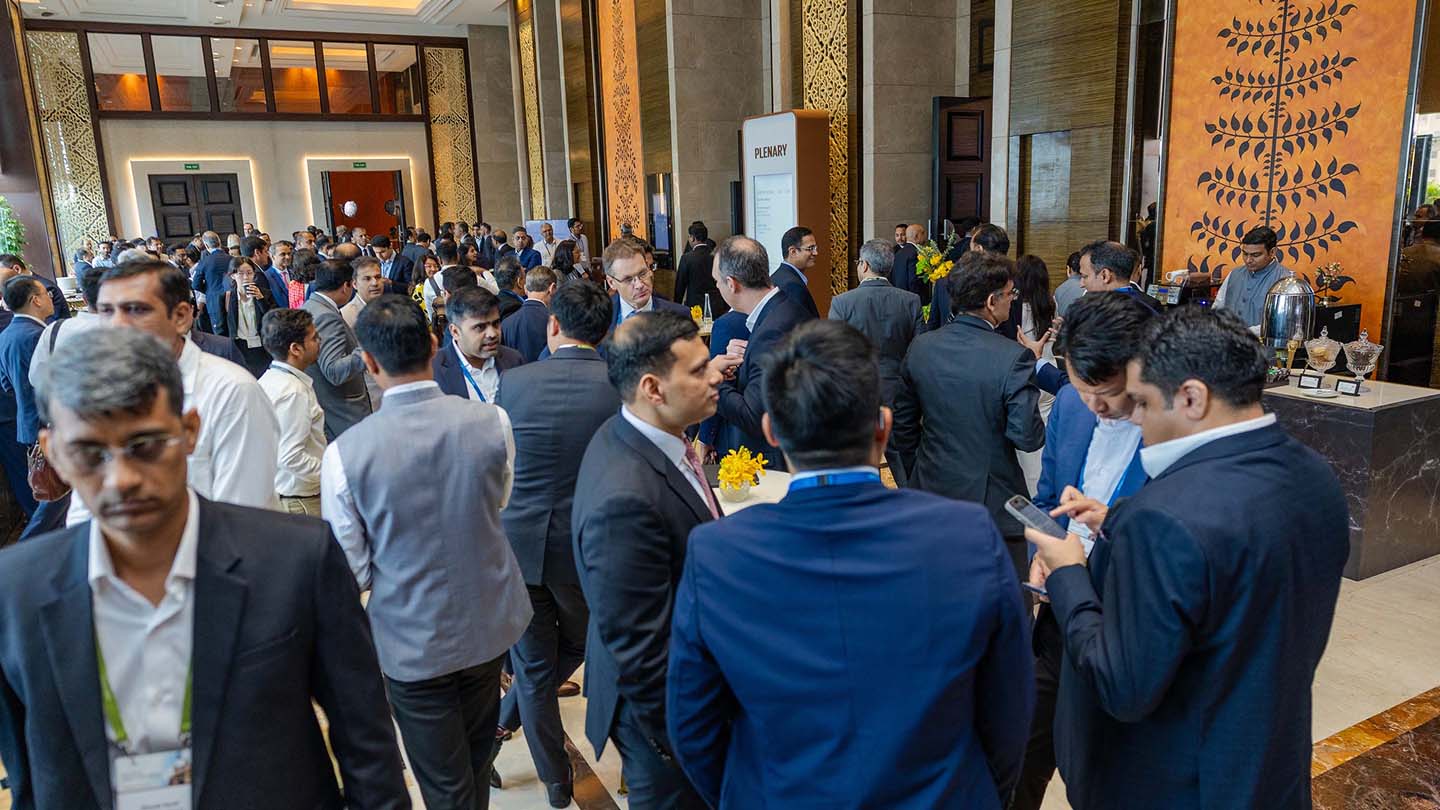






Making an impact
JPMorganChase has been making an impact in India since 1945.
$65B+
in credit and capital provided to clients across various industries since 2019
55,000+
employees
120,000+
volunteer hours completed in 2024
$70M
philanthropic contributions since 2019
331K+
Instances of improved financial health due to philanthropic programs
100,000+
people assisted in accessing promising career pathways since 2019
Related insights

GLOBAL RESEARCH
What could push India’s equity market higher in the long run?
India’s equity market has experienced significant pressure over the past year, but recent pro-growth policies, including major GST reforms, have boosted the outlook for earnings and could set the stage for a stock market rally.

GLOBAL CORPORATE BANKING
Perspectives from Asia Pacific
Explore Global Corporate Banking's Asia Pacific market outlook.

PAYMENTS
J.P. Morgan Payments in Asia-Pacific
At J.P. Morgan, we’re thinking differently about the power of payments. Let us help you rethink what payments can do for you.
This conference is by invitation only and is not transferable. The conference is not open to the media.
Modal title
You're now leaving J.P. Morgan
J.P. Morgan’s website and/or mobile terms, privacy and security policies don’t apply to the site or app you're about to visit. Please review its terms, privacy and security policies to see how they apply to you. J.P. Morgan isn’t responsible for (and doesn’t provide) any products, services or content at this third-party site or app, except for products and services that explicitly carry the J.P. Morgan name.